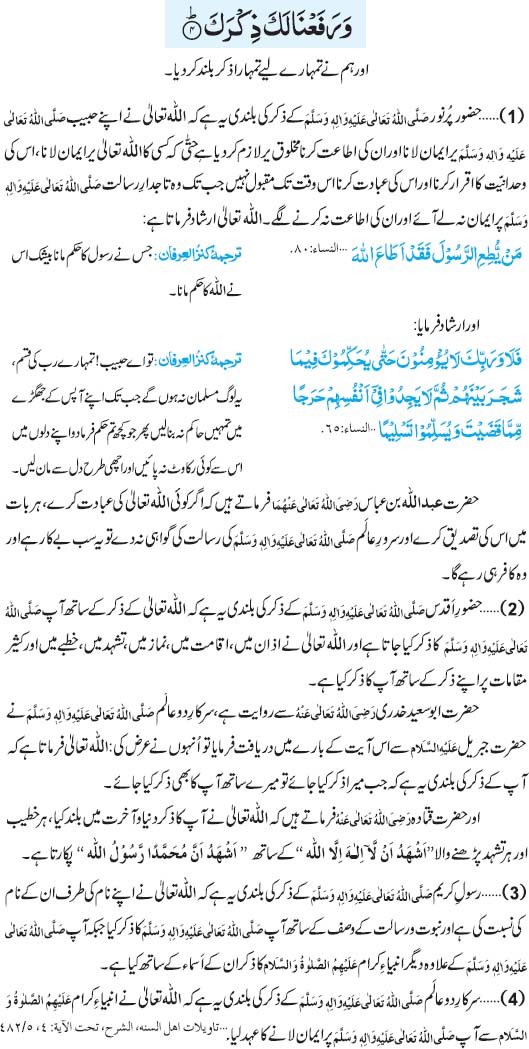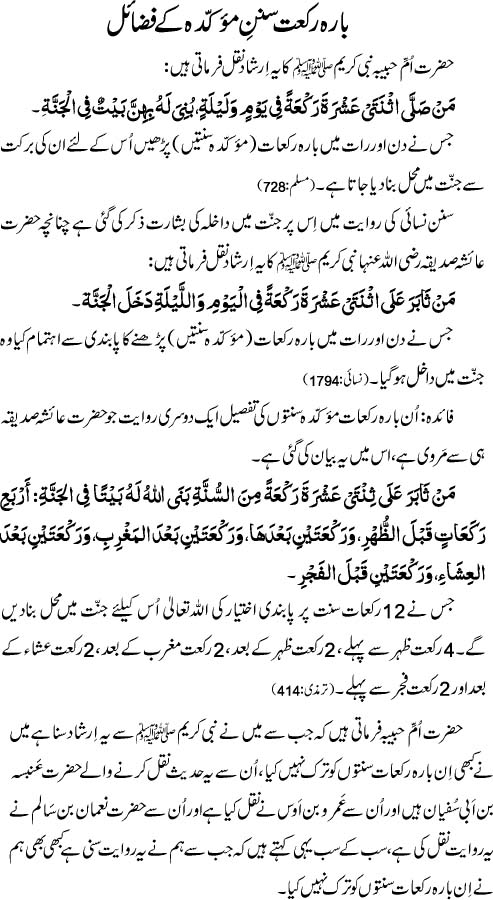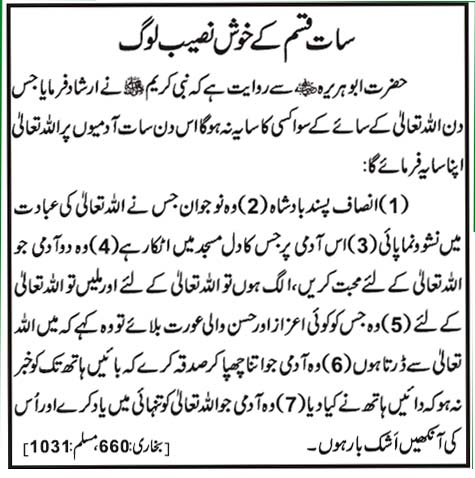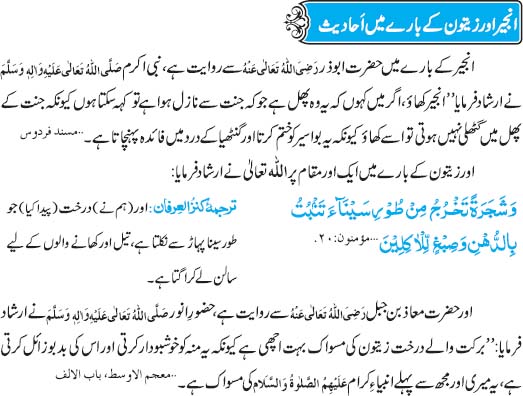
Aur Hum Nay Tumhare Liye Tumhara Zikr Buland Kar Diya
Rewards for Sickness
In the name of Allah, the Most Merciful, the All-Compassionate
“May the Peace and Blessings of Allah be Upon You”
Praise be to Allah, we seek His help and His forgiveness. We seek refuge with Allah from the evil of our own souls and our bad deeds. Whomsoever Allah guides will never be led astray, and whomsoever Allah leaves astray, no one can guide. I bear witness that there is no god but Allah, and I bear witness that Muhammad is His slave and Messenger.
Rewards for Sickness
One should not look to sickness as a gloomy episode, but should remember the great good in it. It is one form of affliction with which Allah (SWT) tests His servants, giving them a chance to acquire rewards, as was explained above, as is further emphasized below.
Removal of Sins and Elevation in Ranks
Abu Hurayrah (RA) reported that the Prophet (SAW) said: “Whenever a Muslim is afflicted by harm from sickness or other matters, Allah will drop his sins because of that, like a tree drops its leaves.”
[Bukhari and Muslim]
Abu Saeed al-Khudree (RA) reported that the Prophet (SAW) said: “A Muslim is not afflicted by hardship, sickness, sadness, worry, harm, or depression – even if pricked by a thorn, but Allah expiates his sins because of that.” [Bukhari and Muslim]
Aishah (RA) narrated that once some pain afflicted the Prophet (SAW), causing him to suffer and turn about in his bed. She said, “Had one of us done this, you would have blamed him.” He (SAW) replied: ” An ailment is intensified for the righteous. Whenever a believer is afflicted by a hardship, whether it is a thorn or more, a sin is taken off from him because of it, and he is elevated by one rank (in Jannah). ” [Ahmad]
Retaining Rewards for Deeds Before Sickness
Usually, when a believer falls sick, he would not be able to do the same amount of good (prayer, fasting, helping Muslims, etc.) that he used to do when he was well. But Allah, out of His great mercy, continues to record for him the good deeds that he was forced to stop because of his sickness.
Abu Moosa Al-Asharee narrated that the Prophet (SAW) said: “For a traveling or sick person, his deeds will be recorded in accordance with what he used to do when he was resident or well.” [Bukhari]
Abdullah Bin Amr reported that the Prophet said: “No (believing) person gets sick, but (his deeds) will be recorded for him in accordance with what he used to do when he was well.” [Bukhari]
Uqbah Bin Aamir reported that the Prophet (SAW) said: “Each day’s deeds are sealed with it. Thus, when a believer gets sick, the angels say, ” Our lord! Your servant such and such, You have restrained him (from doing good this day).” And the lord replies, ” Seal his day in accordance with his (usual) deeds, until he is cured or dies”. [Ahmad]
Reason for the Reward
Atta Bin Rabaah reported that Ibn Abbaas (RA) told him, “Do you want to see a woman from the people of Jannah (paradise)?”
He said “Yes”.
He said, ” It is this black woman.
She had come to the Prophet (SAW) saying,” I have (epileptic) seizures, and I get exposed, so supplicate to Allah for me.”
He (SAW) said: ” If you wish, be patient, and you will attain Jannah; or if you wish, I will ask Allah to cure you.”
She replied, ” I will be patient ! But my body gets exposed (because of the fall), so supplicate to Allah for me that I do not become exposed.” and he (SAW) did.” [Bukhari and Muslim]
The scholars have differed in opinion as to whether a sick person will be rewarded for the sickness itself or for being patient during it. The correct opinion is that if he is patient and submits to Allah’s will, as in the above hadith, he would be rewarded for both the submission and the sickness; otherwise, he would not be rewarded at all, because he resented Allah’s decree. This is what should be understood from Ibn hajar al-Asqalaanees words: “The authentic hadeeths are clear in that the rewards are recorded once affliction strikes a Muslim. As for patience and acceptance, they are virtues for which a person may get additional rewards over those for the affliction.” ‘Abdullah Bin ‘Amr reported that the Prophet (SAW) said: “If a Muslim is pricked by (as little as) a thorn in the worldly life, and he seeks its reward from Allah, and some of his sins will be removed. because of it, on the Day of Judgement.”[ Bukhari ]
“True believers are only those whose hearts are filled with awe whenever God is mentioned, and whose faith is strengthened whenever His revelations are recited to them. In their Lord do they place their trust.” (Chapter 8: Verse 2)
By Asma bint Shameem
12 Rakat Sunnat-e-Muakkadah Kay Fazail

12 (Bara) Rakat Sunnat-e-Mokada Kay Fazail
Supplications From Allah’s Quran
Hazrat Bashar Hani

Hazrat Bashar Hani Rehmat Ullah Aleh
A Muslim Believer’s Attitude During Times Of Difficulties And Calamities
“… So, one may wonder how to distinguish whether a person is being simply tested by Allah Ta’ala or being punished for one’s sins…”
As part of our Islamic faith, we believe that all matters are in the hands of Allah Ta’ala. However, for some of us our faith can get shaken during times of trials and hardships. It is during those times, though, that we should remind ourselves that a believer’s position and rank is raised in front of Allah Ta’ala and that such a hardship may very well be a sign of Allah’s love for the believer. This can help us maintain and even strengthen our faith.
Great Rewards Associated with Great Calamities
It was narrated from Anas ibn Malik that the Prophet (Sallallaahu Alaihi Wasallam) said: “Great reward comes with great trials. When Allah loves a people, He tests them, and whoever accepts it attains His pleasure, whereas whoever shows discontent with it incurs His wrath.” Narrated and classed as hasan by at-Tirmidhi (2396)
In this hadith, we find that the Prophet (Sallallaahu Alaihi Wasallam) has provided a message of relief for those who endure difficulties with patience. He also associated the greatness of difficulties and calamities with higher rewards. So, enduring through lighter problems and challenges has a smaller reward than enduring greater difficulties and challenges. Given that this life has its share of challenges and difficulties for all, Allah Ta’ala has provided an opportunity for high rewards for those who endure these challenges with patience rather than with complaints and ingratitude. And for those who show displeasure and discontent with Allah’s decree end up in a lose-lose situation because not only do they have to live through their current suffering, but also incur Allah’s wrath for their displeasure and discontent with His decree.
We should also realize that our patience when facing difficulties raises our status in front of Allah and may lead to the forgiveness of our sins. He says in the Quran:
“… Only those who are patient shall receive their reward in full, without reckoning” Quran (Surah Az-Zumar:10)”
The Prophet (Sallallaahu Alaihi Wasallam) said: “Nothing befalls a believer, a (prick of a) thorn or more than that, but Allah will raise him one degree in status thereby, or erase a bad deed.” Narrated by al-Bukhaari (5641) and Muslim (2573).
The Messenger (Sallallaahu Alaihi Wasallam) said in a well-known hadith the following: “How wonderful is the affair of the believer, for his affairs are all good, and this applies to no one but the believer. If something good happens to him, he is thankful for it, and that is good for him. If something bad happens to him, he bears it with patience, and that is good for him.” (Narrated by Muslim, 2999).
We should also realize that when Allah puts His steadfast believers through trials and tribulations, that is a sign of His love for them. It was narrated that Anas (may Allah be pleased with him) said: “If Allah wills good for His slave, He hastens his punishment in this world, and if He wills bad for His slave, He withholds from him (the punishment for) his sin, until He requites him for it on the Day of Resurrection.” Narrated and classed as hasan by at-Tirmidhi (2396)
Al-Hasan al-Basri (may Allah have mercy on him) said: “Do not resent the calamities that come and the disasters that occur, for perhaps in something that you dislike will be your salvation, and perhaps in something that you prefer will be your doom.”
Al-Fadl ibn Sahl said: “There is a blessing in calamity that the wise man should not ignore, for it erases sins, gives one the opportunity to attain the reward for patience, dispels negligence, reminds one of blessings at the time of health, calls one to repent and encourages one to give charity.”
Calamities and Problems – Trials or Punishment?
We also know that some who face difficulties are punished for their sins. So, one may wonder how to distinguish whether a person is being simply tested by Allah Ta’ala or being punished for one’s sins. In this context, scholars have said that “(as Allah knows a person beforehand), the sign of calamity by way of punishment shows as signs of impatience and ingratitude in a person when a calamity befalls, and the sign of calamity by way of expiation and erasing of sins shows as contentment, acceptance, and patience in accepting the will of Allah Ta’ala until relief comes.”
Furthermore, if the one who is affected shows displeasure and panic, then it cannot be thought that his calamity is an honor from Allah Ta’ala to raise him in status, because Allah Ta’ala, may He be glorified, knew that he would not be patient and accept it with contentment. So in this case, it is most likely that it is a requital and punishment.
Also, if the Muslim is a devoted worshiper, obedient and righteous, and there is nothing between him and Allah but true ‘uboodiyyah (servitude), gratitude, praise, repentance and submission to Him, may He be glorified, then it is most likely that this calamity is a kind of honor and raising in status, and people are the witnesses of Allah Ta’ala on earth. If they know him to be righteous, then they may give him the glad tidings of raised status before Allah Ta’ala if he is patient in bearing the calamity. (source: islamqa.info)
Regarding difficulties, in the following verse, Allah compares the situation of the one who is steadfast in his faith and facing difficulties with those who are evildoers and are in a similar situation:
“… if you are suffering (hardships) then surely, they (too) are suffering (hardships) as you are suffering, but you have a hope from Allah (for the reward) that for which they hope not; and Allah is Ever All-Knowing, All-Wise” Quran (Surah An-Nisa:104).
So, a true believer can face his difficulties with a positive state of mind, hoping for rewards from Allah Ta’ala and such an attitude can provide true relief and happiness. Besides, if Allah lifts this calamity from the believer and saves him from the torment, then that can double the reward and happiness. Allah Ta’ala says in the Quran: “… and give glad tidings to As-Sabirun (the patient).”
Who, when afflicted with calamity, say: “Truly! To Allah, we belong and, truly, to Him, we shall return.”
They are those on whom are the Salawat (i.e. who are blessed and will be forgiven) from their Lord, and (they are those who) receive His Mercy, and it is they who are the guided ones. Quran (Surah Al-Baqara:155-157)
Saat Qisam Kay Khush Naseeb Log

Saat Qisam Kay Khush Naseeb Log
Torment For Hypocrites And Beguilers, Already Determined
[Allah’s Quran 16:88] “Those who disbelieved and hindered others from the way of Allah – We shall increase for them torment upon torment, for they have been spreading corruption.”
The prophet (Peace Be Upon Him) has said :
[Bukhari, Book #92, Hadith #384] “Narrated Abu Huraira: Allah’s Apostle said, “All my followers will enter paradise except those who refuse.” They said, “O Allah’s Apostle! Who will refuse?” He said, “Whoever obeys me will enter paradise, and whoever disobeys me is the one who refuses (to enter it).”
Anjeer Aur Zaitoon Kay Barey Mein Hadith

Anjeer Aur Zaitoon Kay Barey Mein Hadith
16 Duas To Safe Guard From Kuffar
1) Upon Allah do we rely. Our Lord, make us not [ objects of ] trial for the wrongdoing people. And save us by Your Mercy from the disbelieving people.” [Quran-Surah-Yunus 10/85-86]
2) Our Lord, make us not [ objects of ] torment (severe physical and mental sufferings) for the disbelievers and forgive us, our Lord. Indeed, it is You who is the Exalted in Might, the Wise. [Al-Mumtahinah 60/5]
3) Our Lord, forgive us our sins and the excess [committed] in our affairs and set firmly our feet and give us victory over the disbelieving people. [Al-Imran 3/147]
4) Our Lord, do not place us with the wrongdoing people. [Al-A’raf 7/47]
5) Our Lord! Do not punish us if we forget or make a mistake. Our Lord! Do not place a burden on us like the one you placed on those before us. Our Lord! Do not burden us with what we cannot bear. Pardon us, forgive us, and have mercy on us. You are our ˹only˺ Guardian. So grant us victory over the disbelieving people
[Al-Baqarah 2/286]
6) Our Lord, pour upon us patience and plant firmly our feet and give us victory over the disbelieving people.
[Al-Baqarah 2/250]
7) My Lord, support me against the corrupting people. [Al-Ankabut 29/30]
8) My Lord, save me from the wrongdoing people. [Al- Qasas 28/21]
9) My Lord, then do not place me among the wrongdoing people. [Al-Muminun 23/94]
10) Indeed, I am overpowered, so help (me). [Al-Qamar 54/10]
11) Sufficient for me is Allah; there is no deity except Him. On Him, I have relied, and He is the Lord of the Great Throne [At-Tawbah 9/129]
From Hadith and Sunnah
12) O Allah, we place You before them and we take refuge in You from their evil. [Abu Dawood 2/89-AlHaakim declared it authentic]
13) O Allah! I seek refuge with you from (worries) care, and grief, from incapacity and laziness, from miserliness and cowardice, from being heavily in debt and from being overpowered by other men. [Bukhari 8/374]
14) Allah’s Apostle used to seek refuge with Allah from the difficult moment of a calamity and from being overtaken by destruction and from being destined to an evil end, and from the malicious joy of enemies. [Bukhari 8/358]
15) O Allah, protect me from them with what You choose. [Muslim 4/2300]
16) Indeed, we belong to Allah, and indeed to Him we will return. O Allah! Reward me for my calamity, and replace it for me with that which is better. [Muslim]

